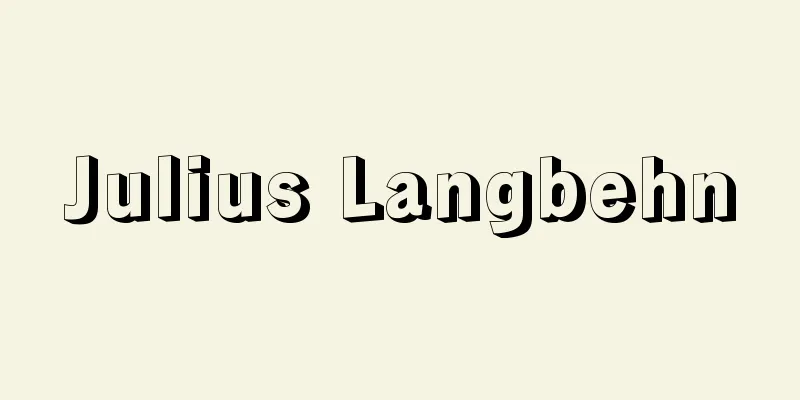Julius Langbehn

|
1851‐1907 German cultural critic. Author of the anonymous book "Rembrandt the Educator" (1890), which caused a great sensation by explaining the nature of German culture in opposition to the influx of foreign ideas of naturalism and decadence in the 1880s. He considered European ideas of social reform to be frivolous, and advocated that Germans should live inwardly and value their simple national spirit, becoming a marker of the conservative nationalist ideology that grew from the end of the century until the rise of the Nazis. [Kanshina Yoshio] Source: Heibonsha World Encyclopedia, 2nd Edition Information |
|
1851‐1907 ドイツの文化批評家。1880年代に自然主義やデカダンス思想が外国から流入したのに対抗してドイツ固有の文化のあり方を説いて大きな反響を得た匿名の書《教育者レンブラント》(1890)の著者。ヨーロッパの社会改良思想を軽薄なものとみなし,ドイツ人は内面性に生き,素朴な民族精神を重んじることを提唱し,世紀末からナチス台頭まで増殖していく保守的民族主義イデオロギーの指標となった。【神品 芳夫】 出典 株式会社平凡社世界大百科事典 第2版について 情報 |
>>: Languedoc - Languedoc (English spelling)
Recommend
Distribution of nobles - Kugyobunpai
...The term refers to the nobleman who presides o...
Lycium chinense; boxthorn
A deciduous shrub of the Solanaceae family. It oft...
Horatio
〘Noun〙 (oratio, also written as 「当辣諸」) A Christian...
Household number of people and horses change register - Household number of people and horses change register
In the Edo period, the shogunate and feudal domain...
pilot balloon
...the most common use is in meteorological obser...
Suchium obsoletum (English spelling) Suchium obsoletum
…[Tadashige Nabe]. . … *Some of the terminology t...
Joint Forces - Tougougun
A unit made up of multiple military services, incl...
Cynewulf
An 8th century English poet. Dates of birth and de...
Nottingham (English spelling)
A city in central England. A unitary authority. It...
bottom quark
…Furthermore, in 1977, an experiment using the pr...
Antependium
… [Masao Fujii] [Christian altar decoration] The ...
Local History - Chihoushi (English)
A comprehensive geographical book of China that fo...
IGY - Integrative Geometry
《 International Geophysical Year 》⇒International G...
Heart line
It shows how emotions such as joy, anger, sadness ...
Geometrical optics
A branch of optics that considers light as a coll...








![Mihama [town] - Mihama](/upload/images/67ccf537e7bcd.webp)
